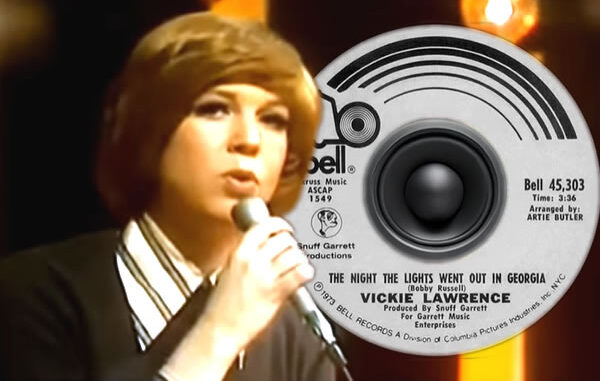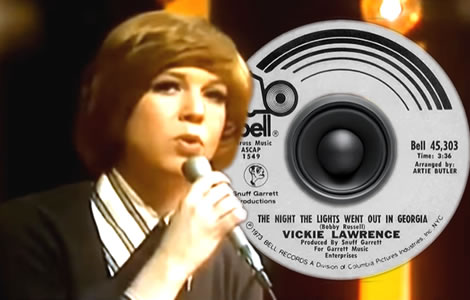
Vicki Lawrence, best known for her comedic roles on “The Carol Burnett Show,” made a significant mark on the music world with her 1972 hit single “The Night the Lights Went Out in Georgia.”

The song, written by Bobby Russell, achieved remarkable success both in the United States and internationally. It also carried subtle political overtones reflective of the era’s social and political climate.
Success in the USA and Worldwide
“The Night the Lights Went Out in Georgia” was released as a single in November 1972 and quickly climbed the charts. By April 1973, it reached the number one spot on the Billboard Hot 100, where it stayed for two consecutive weeks. This success was notable for Lawrence, primarily known for her television work rather than her singing career. The single sold over one million copies and was certified Gold by the RIAA.
Internationally, the song also performed well, particularly in Canada, where it topped the RPM 100 national singles chart. It reached number six on the UK Singles Chart, further establishing Lawrence’s international presence. The narrative style and haunting melody resonated with a broad audience, allowing the song to transcend cultural and geographical boundaries.
Political Overtones
“The Night the Lights Went Out in Georgia” tells a dark and dramatic story involving betrayal, murder, and a miscarriage of justice in a small Southern town. The song’s lyrics paint a vivid picture of a man wrongfully accused and executed for a crime he did not commit, while the real culprit remains undiscovered. This narrative can be interpreted as a critique of the judicial system and the flaws within it, particularly in the context of the Southern United States.
The political overtones in the song align with the growing awareness and criticism of systemic issues in American society during the early 1970s. The civil rights movement of the 1960s had exposed deep racial and social inequalities, and by the early 1970s, these themes continued to influence popular culture. The song’s setting in the South, a region historically associated with racial tension and judicial bias, adds another layer to its political commentary.
Context in the United States and Worldwide
When “The Night the Lights Went Out in Georgia” became a hit, the United States was experiencing significant social and political upheaval. The early 1970s were marked by the Vietnam War, which had led to widespread protest and dissent. The war’s unpopularity was compounded by the Watergate scandal, which broke in 1972 and led to a deepening distrust in government. President Richard Nixon’s administration was under intense scrutiny, and the political atmosphere was one of skepticism and disillusionment.
The song’s themes of injustice and betrayal resonated with an audience increasingly aware of the fallibility and corruption within institutions. The wrongful execution in the song’s narrative could be seen as a metaphor for the perceived injustices carried out by those in power during this turbulent period.
Globally, the early 1970s were also a time of significant change. The Cold War continued to influence international relations, with tensions between the United States and the Soviet Union impacting global politics. In 1972, the Strategic Arms Limitation Talks (SALT I) resulted in an agreement between the two superpowers to limit the production of nuclear weapons, reflecting a cautious move towards détente.
In addition, the oil crisis of 1973, which began later in the year, led to economic instability and highlighted the interconnectedness of global economies. The period was characterized by both hope for diplomatic progress and anxiety over ongoing conflicts and economic challenges.
Current playing as a Phoenix on Capitol fm – a classic
“The Night the Lights Went Out in Georgia” has endured as a classic, covered by various artists over the years. Notably, Reba McEntire released her version of the song in 1991, which also achieved considerable success. The song’s storytelling and its haunting portrayal of injustice continue to captivate audiences, making it a timeless piece of American music history.
Moreover, the song’s success helped cement Vicki Lawrence’s place in the entertainment industry beyond her comedic talents. It demonstrated her versatility and ability to connect with audiences in multiple formats, from television to music.
In conclusion, “The Night the Lights Went Out in Georgia” stands as a significant cultural artefact from the early 1970s, reflecting the era’s social and political tensions while achieving remarkable success in the United States and worldwide.
Its narrative of injustice and betrayal resonated deeply with listeners during a time of widespread societal upheaval, making it not only a commercial triumph but also a poignant commentary on the era’s challenges.
